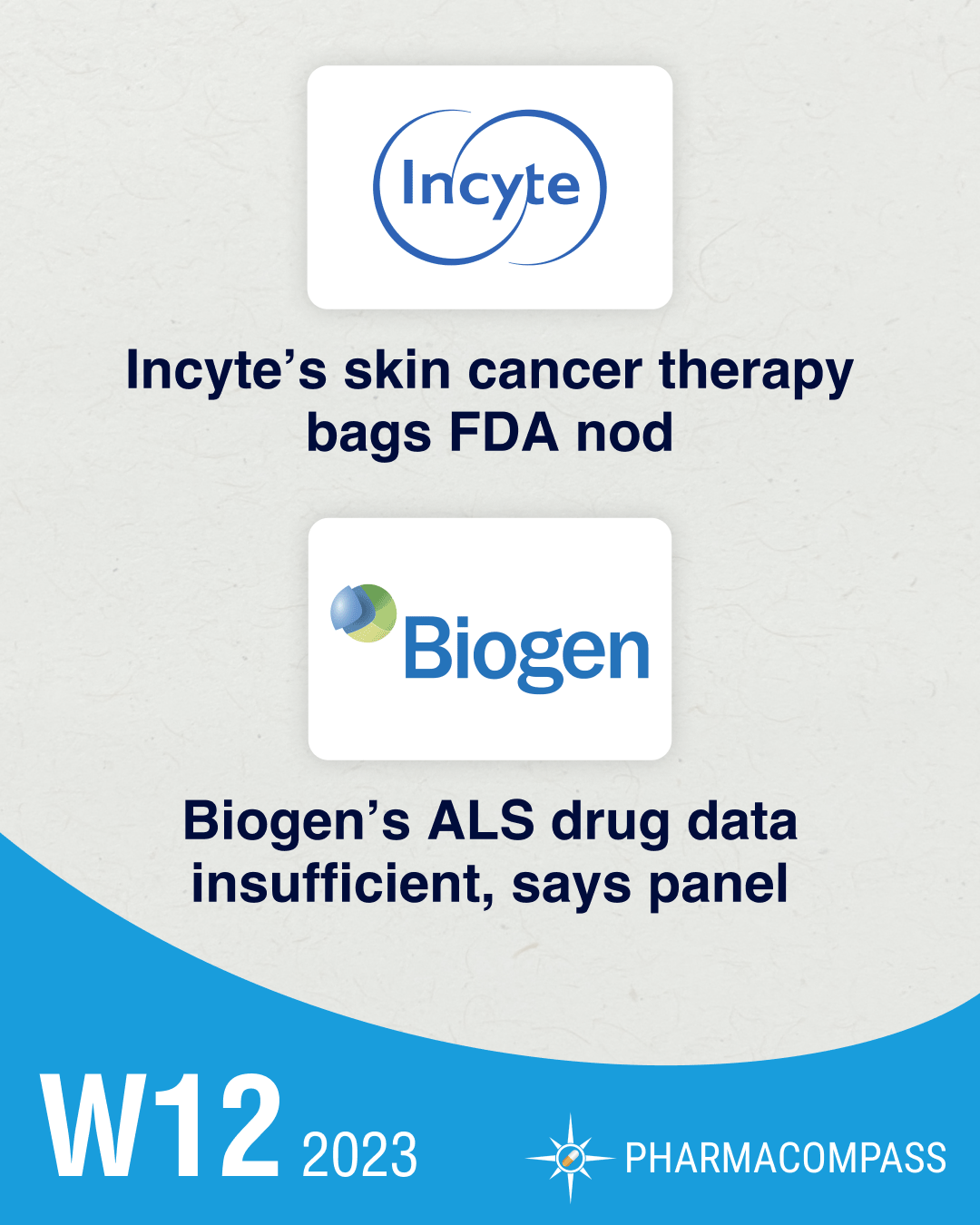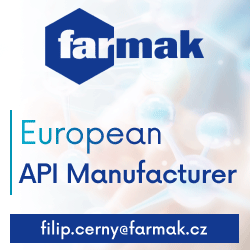
By PharmaCompass
2023-03-23
Impressions: 1,242 Article
The US Food and Drug Administration (FDA) has granted accelerated approval to Incyte’s monoclonal antibody Zynyz (retifanlimab) as a treatment for a rare and aggressive type of skin cancer known as Merkel cell carcinoma.
A panel of external experts to the FDA has partially supported Biogen’s drug tofersen, which targets a rare form of amyotrophic lateral sclerosis (ALS). The panel said the drug failed to provide sufficient evidence to clearly demonstrate the drug’s effectiveness.
The agency has denied approval to AbbVie’s Parkinson’s therapy and has asked for more information on the device used to administer the medication. Meanwhile, AbbVie’s blockbuster drug Skyrizi has beaten Novartis’ Cosentyx and Eli Lilly's Taltz in a late-stage trial on adults with moderate-to-severe plaque psoriasis.
Pfizer has recalled 4.2 million units of its Nurtec ODT prescription migraine drug because it failed to meet child-resistant packaging requirements. Sanofi has joined Eli Lilly and Novo Nordisk in reducing the prices of its insulin products. And Eli Lilly and Roche have joined hands to develop a blood test that can detect early signs of Alzheimer’s disease.
In regulatory news, FDA has issued Form 483s to Torrent Pharmaceuticals’ oral-oncology manufacturing facility and Bliss GVS Pharma’s manufacturing facility in India.
Takeda has announced positive results from a phase 2b trial investigating its oral drug TAK-279 in treating moderate-to-severe plaque psoriasis. And Karuna Therapeutics’ experimental schizophrenia drug KarXT has succeeded in a second late-stage clinical trial
Incyte receives FDA’s accelerated approval for rare skin cancer treatment
FDA has granted accelerated approval to Incyte’s monoclonal antibody Zynyz (retifanlimab) as a treatment for a rare and aggressive type of skin cancer known as Merkel cell carcinoma (MCC) in patients for whom the cancer has come back or spread to other parts of the body.
The decision was based on the results of a mid-stage study, which showed the therapy reduced tumor size or removed all signs of cancer in patients. Zynyz will compete with Keytruda from Merck and Bavencio from Pfizer and Merck KGaA in the MCC market. Incyte expects the drug to be available to eligible patients by early April.
The FDA has also expanded the use of Regeneron’s drug Evkeeza as a treatment for homozygous familial hypercholesterolemia, an ultra-rare disease that leads to high cholesterol, in children.
FDA panel partially supports Biogen’s drug tofersen for rare form of ALS
A panel of external experts to the FDA has partially supported Biogen’s drug tofersen, which targets a rare form of amyotrophic lateral sclerosis (ALS).
In a 9-0 decision, the panel decided that the drug’s ability to reduce levels of a blood protein associated with nerve-cell injury is a likely sign that patients are being helped. This decision opens the possibility of accelerated approval for the drug. However, in a separate vote, the panel voted 5-3 that Biogen failed to provide sufficient evidence to clearly demonstrate the drug’s effectiveness.
Despite tofersen failing to show clear efficacy in a phase 3 trial, Biogen had applied for accelerated approval based on its ability to reduce blood protein levels. Recently, FDA officials had hinted that tofersen could receive accelerated approval despite its failure in the late-stage trial.
FDA denies approval to AbbVie’s Parkinson’s therapy; asks for more info on device
AbbVie’s ABBV-951 was being touted as “the biggest product launches” in the coming years. But the treatment — which is a formulation of foscarbidopa-foslevodopa — has been denied FDA approval.
While the FDA didn’t raise any questions about ABBV-951’s efficacy or safety, it has requested additional information on the device used to administer the treatment. AbbVie has said it plans to resubmit the application as soon as possible.
Meanwhile, AbbVie’s blockbuster drug Skyrizi (risankizumab) has shown positive results in a late-stage trial in adults with moderate-to-severe plaque psoriasis who still experience symptoms despite at least six months of treatment with Novartis' Cosentyx (secukinumab) and Eli Lilly's Taltz (ixekizumab). After a year of treatment, Skyrizi completely cleared or minimized the skin disease in 63 percent of patients.
Roche, Lilly team up to develop blood test to detect early signs of Alzheimer's
Eli Lilly and Roche have joined hands to develop a blood test that can detect early signs of Alzheimer’s disease and determine whether a patient should go for further confirmatory testing. The duo plan to kick off a two-year clinical trial involving hundreds of volunteers.
Lilly, Eisai and Biogen are working on drugs aimed at slowing the advancement of Alzheimer’s disease. However, these drugs require a diagnosis at earlier stages of the disease, and this is where Roche and Lilly’s blood test will come in handy.
Pfizer recalls 4.2 million units of migraine drug Nurtec ODT over packaging defect
Pfizer has recalled 4.2 million units of its Nurtec ODT prescription migraine drug because it failed to meet child-resistant packaging requirements. The US Consumer Product Safety Commission (CPSC) said the 75 mg orally disintegrating tablets that come in cartons containing a single blister card of eight tablets could cause a potential risk of poisoning if ingested by young children.
Pfizer, which acquired Nurtec ODT through its US$ 11.6 billion acquisition of Biohaven in 2022, said it is developing a new child-proof packaging to ensure the safety of patients.
FDA issues Form 483 to Torrent, Bliss’ Indian manufacturing facilities
Torrent Pharmaceuticals’ oral-oncology manufacturing facility at Bileshwarpura (Gujarat, India) has received a Form 483 with one observation from the FDA. The agency has also issued a Form 483 with three minor observations to Bliss GVS Pharma’s manufacturing facility at Palghar (Maharashtra, India). The company said the observations are procedural in nature and do not relate to data integrity. The agency inspected both the facilities from March 13 to 17.
Sanofi joins insulin bandwagon, cuts price of Lantus by 78 percent
After Eli Lilly and Novo Nordisk, Sanofi became the third drugmaker this month to slash the prices of its insulin products. The French drugmaker will cut the US prices of its most prescribed insulin Lantus by 78 percent and fast-acting insulin Apidra by 70 percent starting next year.
Meanwhile, Sanofi and partner Regeneron’s blockbuster drug Dupixent has been authorized by the European Commission for the treatment of severe atopic dermatitis in children between the ages of six months and five years.
Takeda announces positive mid-stage trial results for its plaque psoriasis drug
Takeda has announced positive results from a phase 2b trial investigating its oral drug TAK-279 in treating moderate-to-severe plaque psoriasis. The Japanese drugmaker acquired the drug through its US$ 4 billion acquisition of Nimbus Lakshmi, a subsidiary of Nimbus Therapeutics that works on TYK2 programs.
Karuna’s schizophrenia drug wins late-stage trial: Karuna Therapeutics’ experimental schizophrenia drug KarXT has succeeded in a late-stage clinical trial, significantly reducing symptoms of the disease compared to a placebo after five weeks of treatment. The drug had previously hit the main goals in two other mid- to late-stage trials. Karuna is planning to seek FDA approval in mid-2023.
Gilead’s cell therapy extends survival in lymphoma study: Gilead Sciences’ cell therapy Yescarta helped adult patients with relapsed or refractory large B-cell lymphoma (LBCL) live longer than standard treatment in a late-stage trial. The CAR-T therapy led to a statistically significant improvement in overall survival as compared to traditional treatment, which involves a combination of high-dose chemotherapy and a stem cell transplant.The PharmaCompass Newsletter – Sign Up, Stay Ahead
Feedback, help us to improve. Click here
Image Credit : Phisper Infographic by PharmaCompass license under CC BY 2.0
“ The article is based on the information available in public and which the author believes to be true. The author is not disseminating any information, which the author believes or knows, is confidential or in conflict with the privacy of any person. The views expressed or information supplied through this article is mere opinion and observation of the author. The author does not intend to defame, insult or, cause loss or damage to anyone, in any manner, through this article.”







